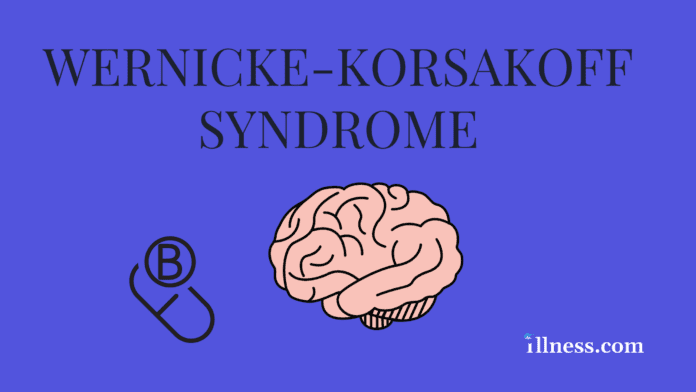Overview Of Wernicke-Korsakoff Syndrome
Wernicke-Korsakoff Syndrome is a brain disorder caused by a deficiency in vitamin B1 (thiamine).
Commonly Associated With
Korsakoff psychosis; Alcoholic encephalopathy; Encephalopathy – alcoholic; Wernicke’s disease; Alcohol use – Wernicke; Alcoholism – Wernicke; Thiamine deficiency – Wernicke
Causes Of Wernicke-Korsakoff Syndrome
Wernicke Korsakoff syndrome and Wernicke encephalopathy are different conditions. However, they often occur together. Both conditions are due to brain damage caused by a lack of vitamin B1.
Lack of vitamin B1 is common in those who have alcohol use disorder, because of poor nutrition and damage to the lining of the stomach. It is also common in people who do not absorb food properly (malabsorption). In the same vein, this can also occur with a chronic illness or after weight-loss (bariatric) surgery.
Korsakoff syndrome, also called Korsakoff psychosis, tends to develop as Wernicke encephalopathy. This occurs as symptoms go away. Wernicke encephalopathy causes damage in the lower parts of the brain (thalamus and hypothalamus). Meanwhile,permanent damage to parts of the brain that involve memory results in Korsakoff psychosis.
Symptoms Of Wernicke-Korsakoff Syndrome
Symptoms of Wernicke encephalopathy include the following:
- Confusion and loss of mental activity that can progress to coma and also death
- Loss of muscle coordination (ataxia) that can cause leg tremor
- Vision changes such as abnormal eye movements (back and forth movements called nystagmus), double vision, eyelid drooping
- Alcohol withdrawal
Symptoms of Korsakoff syndrome:
- An inability to form new memories
- Loss of memory can be severe
- Making up stories (confabulation)
- Seeing or hearing things that are not truly there (hallucinations)
Exams & Tests
Examination of the nervous/muscular system may show damage to many nerve systems:
- Abnormal eye movement
- Decreased or abnormal reflexes
- Fast pulse (heart rate)
- Low blood pressure
- Low body temperature
- Muscle weakness and atrophy (loss of tissue mass)
- Problems with a walk (gait) and coordination
The person may appear poorly nourished. The following tests are used to check a person’s nutrition level:
- Serum albumin (because it relates to a person’s general nutrition)
- Serum vitamin B1 levels
- Transketolase activity in red blood cells (because it is low in people with thiamine deficiency)
- Liver enzymes may be high in individuals with a history of long-term alcohol abuse.
Other conditions that may cause vitamin B1 deficiency include:
- HIV/AIDS
- Cancers that have spread throughout the body
- Extreme nausea and vomiting during pregnancy (hyperemesis gravidarum)
- Heart failure (when treated with long-term diuretic therapy)
- Long periods of intravenous (IV) therapy, but without receiving vitamin B1 supplements
- Long-term dialysis
- Very high thyroid hormone levels (thyrotoxicosis)
- A brain MRI may show changes in the tissue of the brain. But if Wernicke-Korsakoff syndrome is suspected, treatment should start right away. Typically, a brain MRI exam is not needed.
Treatment Of Wernicke-Korsakoff Syndrome
The main goal of treatment is to control symptoms. Certainly, this prevents the disorder from getting worse. In the early stages of the condition, some people may need to stay in the hospital to help control their symptoms.
Monitoring and special care may be needed if the person is:
- In a coma
- Lethargic
- Unconscious
Vitamin B1 is often given by injection into a vein or a muscle as soon as possible. This may improve symptoms of the following:
- Confusion or delirium
- Difficulties with vision. Similarly, difficulties with eye movement
- Lack of muscle coordination
- Vitamin B1 often doesn’t improve the loss of memory and intellect that occur with Korsakoff psychosis.
Stopping the use of alcohol can prevent more loss of brain function, because it prevents damage to various nerves. A nourishing diet that is balanced can help, but it is not a substitute for stopping alcohol use.



